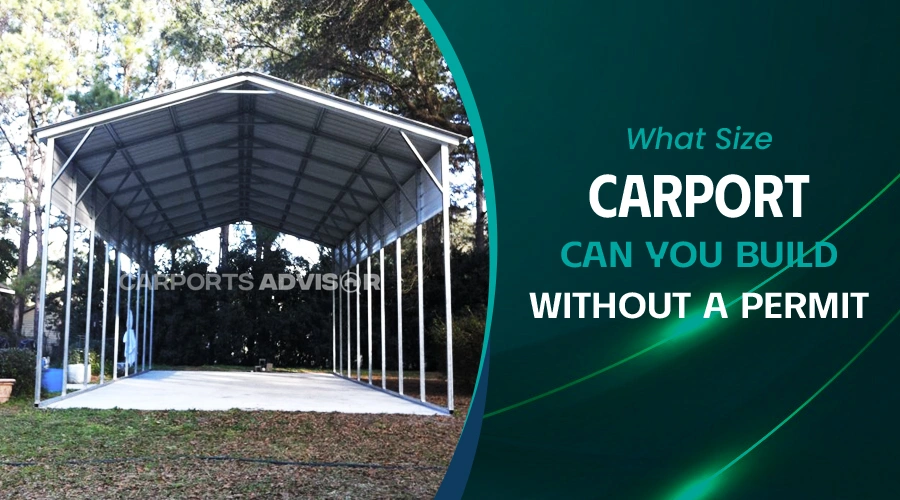
- April 8, 2025
- Metal Carports
- Carports Advisor
What Size Carport Can You Build Without A Permit
If you wish to build a metal carport and don’t know where to begin, start by figuring out your needs and applying for a permit. It is extremely important to navigate through local building codes and regulations to avoid any issues during or after installation. Across the US, permit requirements are different, and understanding these rules will help you in significantly saving time, effort, and money, along with preventing legal issues.
So, let’s dive in to see if you can build a carport without a permit, and if yes, then up to what size.
What is the Purpose of a Building Permit?
Even though they are simple roof-only structures, carports are considered to be construction projects. A building permit is an official document issued by the local government authorities, allowing you to install a structure.
These permits are often issued to ensure that your carports meet certain safety standards, setback requirements, zoning laws, building codes, height restrictions, and minimal local climate requirements.
It is like a seal of approval for your carport, allowing you to ensure that the structure:
- Offers structural safety
- Provides better property value
- Avoids legal penalties
- Complies with zoning laws
- Facilitates insurance coverage
What Carport Dimensions Will Not Require a Permit?
The permit requirements for carports significantly vary across America, as the local building codes and zoning laws determine the necessity of a permit depending on a range of factors, including dimensions.
While there is no universal minimum size that mandates a permit across the country, every jurisdiction has established specific thresholds.
In most states, a permit is typically required for structures exceeding 200 square feet. However, it can be lower or higher, depending on local regulations. For instance, some states like California exempt detached accessory dwelling units up to 120 square feet. Whereas, cities like Snohomish County in Washington can exempt structures up to 400 square feet under specific conditions.
Here is a list of a few states and their minimum permit exemptions based on size:
| Region | Minimum Size Required for Permit |
| Austin, Texas | 200 square feet as long as it is detached and meets setback requirements |
| Florida | Some counties exempt carports under 150 square feet as long as they meet hurricane resistance standards. |
| Rural New York | Carports under 144 square feet are exempted, but urban areas are subject to more restrictions. |
| Arizona | Carports under 200 square feet are usually exempted in unincorporated areas, but major cities like Phoenix see stricter zoning laws. |
| North Carolina | Detached carports under 12 feet tall and 150 square feet are often exempt from requirements. |
Speaking of height restrictions, buildings under 9 feet are usually exempt from permit requirements in urban areas, and those under 11 feet are essentially exempt in rural regions.
Factors Affecting the Permit Requirements
While size restrictions do affect permit requirements, there are a multitude of other reasons why you might require a permit to build or install a carport. Not just the requirement of a permit, the fee payment will also be dependent on these factors:
- Location: Depending on where you live, a big city, a small suburb, or the countryside, the local building codes and zoning requirements are supposed to vary. The zoning laws implemented in your region will decide your minimal permit requirements. Rural areas are likely to see more exemptions than bustling cities.
- Foundation: The type of foundation you install is also likely to affect your permit requirements. For instance, level bases or temporary foundations might not require a permit. However, concrete or permanent foundations are more likely to require additional permits.
- Setback requirements: It refers to the distance of your structure from property lines and other structures, as well as the roads and sidewalks. It is meant to ensure that there is enough space for emergency access as well as maintenance. Not only that, it will also reduce property conflict in the neighborhood. If you wish to build a carport without a permit, then setback requirements are also likely to influence size limitations.
- Intended use: The purpose of installing the carport is going to affect permit requirements, too. Residential carports might face fewer restrictions than those meant for commercial or industrial usage.
- Height: Height clearance is also a critical factor, as many districts impose height restrictions on permit requirements. There are other restrictions pertaining to height, too. For instance, if you are installing a carport within a historic district, there might be restrictions to prevent view obstruction.
- Regional climate conditions: Areas that are prone to adverse weather conditions like heavy snowfall, intense rainfall, tornadoes, hurricanes, or high wind speeds enforce stricter building codes and specific requirements to maintain the structure’s integrity.
What Happens if I Build a Carport Without a Permit?
You can be tempted to bypass the permits in order to save time, money, and effort. However, it isn’t advisable as constructing a metal carport structure without a permit would have severe consequences. Lack of proper authorization can lead to the following issues:
- Legal: Non-compliance with the local building codes can lead to hefty fines as well as legal action against you.
- Resale: Unpermitted carports will hamper the resale of your property and complicate the process by deterring buyers.
- Insurance: Any damage that occurred to the carport, which has been built without a proper permit, will not be covered by insurance companies.
- Safety: Not following permit requirements may cause structural issues in the carport, possibly endangering your life, property, and even your neighbor’s property.
- Remodel: Any expansions or renovations on your unauthorized carport might not be possible without first seeking a permit for the installation.
- Demolition: In case your carport goes against permit requirements, it is likely to be deemed illegal, leading to dismantling and removal. This will not just result in the demolition of the structure but also incur additional tear-down costs.
How to Find Out if You Need a Permit?
Different cities, states, and counties follow different rules and have varied requirements. As they are responsible for issuing a permit, contacting your local government and speaking regarding permit requirements is the best way to find out whether you need one.
You can also carry out in-depth online research by checking state websites or your city’s building and safety department.
Alternatively, with a professional metal building dealer like Carport Advisor, you can receive all the necessary information pertaining to permits, as our qualified experts are familiar with the local laws and can effectively guide you through the process.
Popular Sizes for Permit-Free Carports
Some carport sizes that might not require permits in most regions across the country are:
- 10×10
- 12×12
- 12×20
- 18×20 (in areas with lenient codes)
- 20×20 (in some states when temporary and detached)
It is always best to verify with local authorities in every case.
How to Get a Building Permit?
After determining that you need a permit to install a carport, you need to follow building requirements and guidelines. Here’s how to go about it:
- Enquire about local building codes and regulations.
- Design your carport and obtain pre-made plans. Visualize the structure in your yard, ensuring it complies with necessary requirements, with our 3D building designer.
- Gather a detailed site plan, architectural drawings, placement specifics, blueprints, and other specified documents.
- Complete the building permit application form issued by your local authorities.
- Submit the application along with the fees, which typically range from $50 to $500.
- Wait for the review process and provide any information requested during this stage.
- Once approved, receive the permit and start building!
Build Smart, Build Safe With Carports Advisor
A carport is a wonderful investment, especially if you are looking for a reliable structure that can not just shelter your vehicles but also preserve their pristine condition. Carports offer a practical and cost-effective solution to your parking needs. You can build one without a permit, too, but it requires careful consideration of rules and size regulations. By understanding the requirements, you can effectively opt for permit-free sizes.
When planning to build your carport, contact our team of specialists at (336)-914-1654, as they are well-versed in local specifications and can efficiently guide you through the process.

